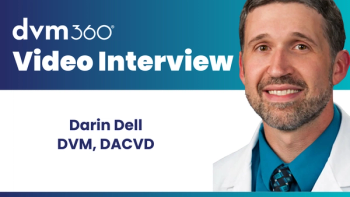
Fitzgerald at CVC: Share the credit; take the blame
Comedian and veterinary TV star shares tips and advice during Power Hour in San Diego.
When Dr. Kevin Fitzgerald, PhD, DABVP, was in charge of the veterinary intern program at Alameda East Veterinary Hospital in Denver, he faced a tricky situation. The practice was receiving complaints about one of the interns. In short, she smelled bad. Dr. Fitzgerald was the lucky one who got to sit down with the intern and talk with her about it.
“How could I have this conversation?” Dr. Fitzgerald asked attendees at CVC San Diego during his Power Hour, titled "A privilege to practice." “This was a hardworking girl who took the overnight shifts, and she would work 16 to 18 hours straight without changing her clothes. She didn’t know she had B.O.”
Wracking his brain for a tactful solution, Dr. Fitzgerald finally hit on something. “I went to the store and I bought two bottles of shampoo, two bottles of body wash, two sticks of deodorant, and two tubes of toothpaste,” he says. “I sat down with this intern and said, ‘You and I are getting letters about our hygiene. I’m so embarrassed. I won't tell if you won't.’”
This story encapsulates the comedy-laced “share the credit, take the blame” theme of Dr. Fitzgerald’s advice to veterinarians. Here are some other “tricks” he shared with the audience:
• Make cheater notes. Write your clients’ kids’ names and birthdays on the inside of the medical record jacket, along with a few details. “Then you can ask, ‘Hey, how’s Sally enjoying ballet? What is she now—12?’” he says. “They’ll be so impressed that you ‘remembered’ she was in ballet. You didn't remember—you’re reading it off the inside of the chart!”
• Have your staff’s back. When a client is yelling or swearing at an employee, go into the room or pick up the phone and tell the pet owner that’s not cool. Let these clients know very nicely that you’ll take care of them and their pets’ needs, but verbal abuse and anger are not permissible. “Your stock will go up a millionfold in your staff’s eyes if you do this, and they’ll do anything for you,” Dr. Fitzgerald says.
• Get involved in organized medicine. Participating in local, state, and national associations builds collegiality, Dr. Fitzgerald says. You’ll also develop a network of people you can call when you need advice and input, either medical or career-related.
• Give clients what they paid for. “Any time you take a radiograph, you should show the client that film,” Dr. Fitzgerald says. “They paid for it. Same goes for blood work—show the client the results. That little old lady may not understand what you’re saying, but she’ll know you took the time to explain things to her, and she’ll tell others that you’re the best.”
Dr. Fitzgerald also shared some tips for dealing with angry clients, as Veterinary Economics Editor Kristi Reimer shares below:
For more from Dr. Kevin Fitzgerald and CVC San Diego, see the Related Links below.
Newsletter
From exam room tips to practice management insights, get trusted veterinary news delivered straight to your inbox—subscribe to dvm360.



